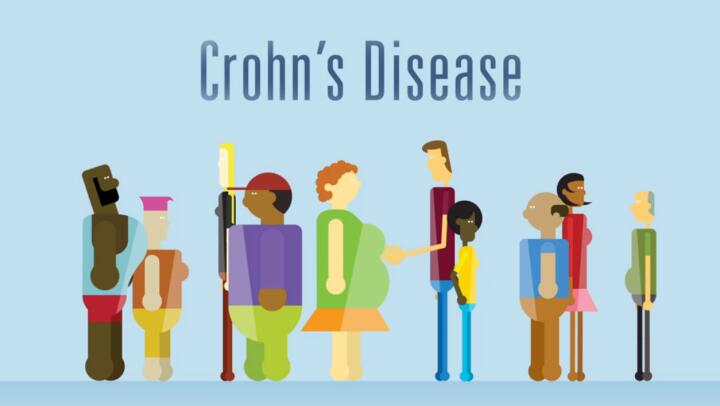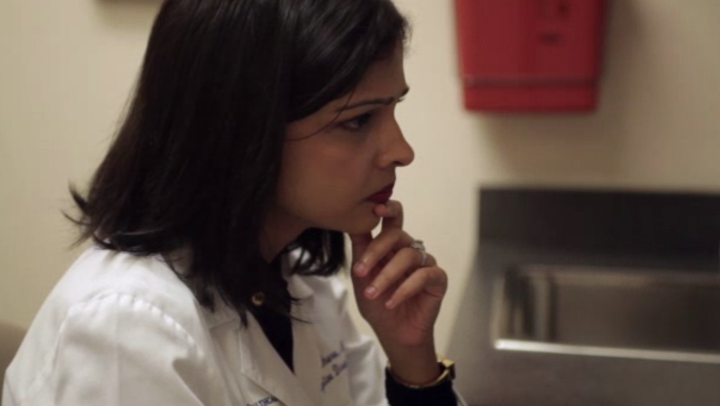
Crohn’s disease is a chronic inflammatory bowel disease (IBD). There’s still no cure for Crohn’s, but with medical treatment, most people are able to continue the activities they enjoy and live long, fulfilling lives. Here’s what to know about living with Crohn’s disease and the new research and treatments that are offering hope and improving Crohn’s disease prognosis.
Prognosis and Living with Crohn’s Disease
It’s impossible to predict exactly how Crohn’s disease will affect your life. Each person is different, and Crohn’s symptoms vary from one person to the next. Risk factors for more progressive disease and worse prognosis include younger age at diagnosis, inflammation or disease activity covering a large part of the bowel, stricturing (narrowing) of the bowel, and involvement of the ileum (last part of the small bowel before the large bowel) or rectum. Patients in which only the colon is affected tend to have a better prognosis with less aggressive disease and less need for surgery in the first 10 years of diagnosis.
Generally speaking, most people will have symptom-free periods (periods of remission) interspersed with Crohn’s attacks, or flare-ups. Some people will be in remission for years at a time and only experience occasional or minor flare-ups. Others will experience frequent flare-ups.
Inflammatory Bowel Disease Video Center
-
 Now Playing
Now PlayingManaging Your Inflammatory Bowel Disease: 3 Tips for People of Color
2:21 -
 Now Playing
Now PlayingAll About Telehealth for Crohn's Disease
2:08 -
 Now Playing
Now PlayingAll About Telehealth for Ulcerative Colitis
2:05 -
 Now Playing
Now PlayingUlcerative Colitis: My Diagnosis Journey
-
 Now Playing
Now PlayingUlcerative Colitis 101
-
 Now Playing
Now PlayingUlcerative Colitis: What Can I Eat?
-
 Now Playing
Now PlayingUlcerative Colitis: Tips to Manage a Flare
-
 Now Playing
Now Playing6 Food Facts for Crohn's Disease
2:05 -
 Now Playing
Now PlayingCrohn's Disease: As Normal As Can Be
2:09 -
 Now Playing
Now PlayingCrohn's Disease: Learning to Live With It
3:06 -
 Now Playing
Now PlayingGetting Through the Day With Crohn's Disease
2:18 -
 Now Playing
Now PlayingHaving a Child With Crohn's Disease
2:12 -
 Now Playing
Now PlayingLiving With Crohn's Disease
1:28 -
 Now Playing
Now PlayingManaging Crohn's Disease
2:52 -
 Now Playing
Now PlayingStaying Positive With Crohn's Disease
2:39 -
 Now Playing
Now PlayingSupporting a Spouse With Crohn's Disease
2:02 -
 Now Playing
Now PlayingEasy on the Belly Smoothie
2:51 -
 Now Playing
Now PlayingTahini Miso Salmon
2:45
For many people, particular foods will trigger a flare-up. Once you’ve identified which foods worsen your symptoms, you can avoid them or minimize your intake. Your healthcare provider can help you figure out the best Crohn’s disease diet plan for you.
Your doctor will tailor your medical treatment to your needs. Most people with Crohn’s take medicine, including anti-inflammatory drugs, antibiotics, steroids, immunosuppressants and biologics to decrease bowel inflammation and control symptoms. It may take time and experimentation to determine which medicine (or combination of medicines) is most effective for you. Your medication regimen may also change with time as your disease progresses.
Surgery for Crohn’s Disease
Many people eventually need surgery; removing part or all of the bowel can dramatically improve symptoms. According to one study, nearly 60% of people with Crohn’s disease underwent surgery within 20 years of diagnosis. After surgery, many people report an improved quality of life. However, symptom recurrence is possible. About 30% of people who have surgery for Crohn’s disease experience recurrence of their symptoms within three years; up to 60% have recurrence within 10 years, according to the Crohn’s & Colitis Foundation.
Effect of Crohn’s Disease on Emotional and Mental Health
The abdominal cramping, diarrhea, and uncertainty associated with a Crohn’s diagnosis can be distressing. Compared to the general population, people with Crohn’s are more likely to suffer from depression. If you experience persistent feelings of hopelessness, anxiety, guilt or sadness, or changes in your sleep, appetite and energy levels, contact your healthcare provider. Individual counseling and participation in Crohn’s or IBD support groups can help, as can prescription medication for depression or anxiety.
Crohn’s Life Expectancy
Crohn’s disease is associated with an increased risk of colorectal cancer. However, people with Crohn’s usually have the same life expectancy as people without Crohn’s disease.
Ongoing Research for a Crohn’s Cure
Scientists have already identified two genetic pathways that seem to be important in the development of Crohn’s. They are working to develop drugs that target those pathways. As researchers learn more about the human genome, they hope to identify additional genetic targets for Crohn’s disease.
In England, researchers are exploring the effectiveness of stem cell transplants as a treatment for Crohn’s. And the U. S. Food and Drug Administration has approved a clinical trial to study the safety and effectiveness of bacteriophages (viruses that have been engineered to destroy specific bacteria) as potential treatments for Crohn’s disease.
One day, we may have a cure for Crohn’s. Until then, patients and healthcare providers will work together to design treatment plans that control patients’ symptoms and allow them to enjoy life.











































